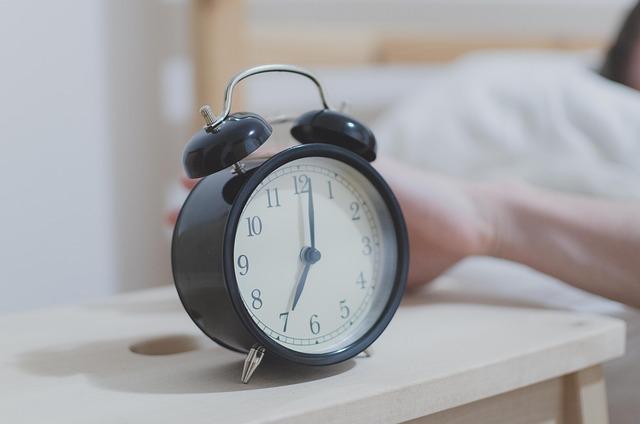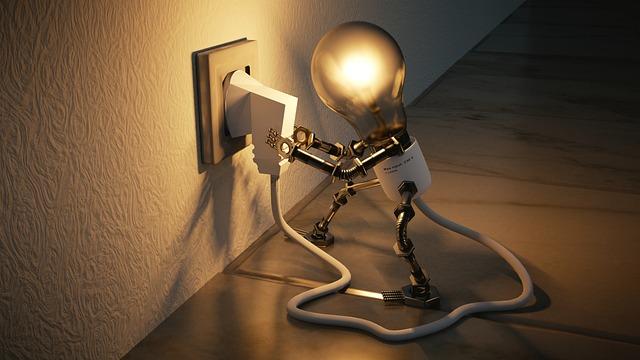Why Is My Alarm Not Waking Me Up? Troubleshoot Your Morning Wake-up Call!

Are you tired of constantly oversleeping and starting your day in panic mode? Do you find yourself asking, “Why is my alarm not waking me up?” Well, worry no more, as we’ve got you covered! In this article, we will delve into the fascinating world of morning wake-up calls and help you troubleshoot the reasons behind your unruly alarm clock. With our expert advice and insider tips, you’ll soon be on your way to reclaiming those precious early morning hours and starting your day with confidence. So, grab your coffee and let’s dive in!
Contents
- 1. Understanding the Mechanics of Alarm Clocks: Unveiling the Inner Workings of Your Morning Wake-up Call
- 2. The Power of Sound: Unveiling the Relationship between Alarm Volume and Effectiveness
- 3. Rise and Shine: Exploring the Impact of Alarm Tone Selection on Your Waking Experience
- 4. The Role of Sleep Patterns: Unveiling How Your Circadian Rhythm Affects Alarm Clock Effectiveness
- 5. Lighting the Way: How Light Intensity and Placement Impact Morning Awakening
- 6. Snooze Button Sabotage: Identifying the Negative Consequences of Repeatedly Hitting the Snooze Button
- 7. Environmental Factors: Unveiling the Influence of Room Temperature and Quality on Alarm Clock Performance
- 8. Alarm Placement Techniques: Finding the Optimal Spot for Your Morning Wake-up Call
- 9. Introducing Smart Alarm Clocks: Leveraging Technology to Personalize Your Waking Experience
- 10. Troubleshooting Tips: Unveiling Solutions for Common Alarm Clock Problems
- 1. Check the Volume
- 2. Ensure the Alarm is Set Correctly
- 3. Check the Power Source
1. Understanding the Mechanics of Alarm Clocks: Unveiling the Inner Workings of Your Morning Wake-up Call
Alarm clocks have become an essential part of our daily routines, helping us wake up on time and start our day. However, there may be instances when your alarm fails to wake you up, leaving you groggy and behind schedule. Don’t worry, though, because we’ve got you covered with some troubleshooting tips to ensure your morning wake-up call is as effective as ever.
-
Check the volume: One of the most common reasons for an alarm’s failure is that the volume is turned down too low. Make sure to check the volume settings on your alarm clock and adjust them to a level that is loud enough to wake you up. If you prefer to listen to music or soothing sounds as you fall asleep, don’t forget to turn down the volume after setting the alarm.
-
Verify the alarm time: Sometimes, we mistakenly set the alarm for the wrong time or forget to set it altogether. Double-check the alarm time to ensure it is set correctly and that you have allotted enough time for a peaceful morning routine. If you’re a heavy sleeper, you might consider setting multiple alarms at five-minute intervals to ensure you don’t oversleep.
- Test the alarm sound: The choice of alarm sound can also play a significant role in waking you up. Experiment with different sounds, such as gentle melodies or more jarring tones, to find the one that works best for you. Additionally, ensure that any sleep mode or snooze settings are turned off, as they can disrupt your sleep cycle and make it harder to wake up.
Remember, a good night’s sleep is crucial for a productive day ahead. By troubleshooting your alarm clock and making necessary adjustments, you can start your mornings on the right foot, feeling refreshed and ready to take on the world.
2. The Power of Sound: Unveiling the Relationship between Alarm Volume and Effectiveness
Have you ever wondered why your alarm is not waking you up in the morning? It could be due to the volume of your alarm. In this post, we will unveil the relationship between alarm volume and its effectiveness.
Many people believe that setting their alarm to a high volume is the key to waking up on time. However, research has shown that alarm volume alone does not guarantee awakening. The power of sound lies in its ability to stimulate our brain and body, and the volume is just one aspect of it.
Here are a few factors to consider when troubleshooting your morning wake-up call:
- Sound frequency: Different frequencies have varying effects on our body. Opt for an alarm with a frequency that is more likely to awaken you, such as a high-pitched tone.
- Consistency: Using the same type of alarm every day can lead to habituation, where our body becomes accustomed to the sound, resulting in us ignoring it. Try switching up your alarm tone periodically to avoid this.
- Placement: The location of your alarm can greatly impact its effectiveness. Ensure it is positioned near your bed, where the sound reaches your ears directly.
- Sleep cycles: Our sleep cycles consist of different stages, including deep sleep and REM sleep. Waking up during a lighter sleep stage can make it easier for us to rise and feel refreshed. Consider using smart alarms that analyze your sleep patterns and wake you up at the optimal time.
Remember, finding the right alarm volume is a personal preference, but it’s crucial to understand that other factors play a significant role in its effectiveness. By considering these factors and troubleshooting your morning routine, you can ensure that your alarm wakes you up and sets the tone for a productive day ahead.
3. Rise and Shine: Exploring the Impact of Alarm Tone Selection on Your Waking Experience
The alarm clock is supposed to be our trusty ally in waking us up, but sometimes it seems to fail us. If you find yourself wondering why your alarm isn’t doing its job, one often overlooked factor could be your choice of alarm tone. Yes, the sound that greets you in the morning can have a significant impact on how well you wake up and start your day.
Research has found that different alarm tones can affect our waking experience in various ways. Some alarm tones may startle us and jolt us out of sleep, while others may gradually awaken us more gently, allowing for a smoother transition from sleep to wakefulness. Additionally, the volume and pitch of the alarm tone can play a role in how we perceive and respond to it.
To troubleshoot your morning wake-up call, consider exploring different alarm tone options to find the one that works best for you. Here are a few tips to help you make the right selection:
1. Avoid harsh and irritating tones: Opt for softer, more pleasant sounds that won’t leave you feeling irritated or stressed when you wake up.
2. Gradual awakening: Look for alarm tones that start softly and gradually increase in volume. This can help ease you out of sleep more gently, minimizing the “shock” factor.
3. Personalize your wake-up experience: Choose alarm tones that resonate with you personally. Whether it’s a favorite song, a soothing melody, or nature sounds, find something that brings you joy and positivity in the morning.
Remember, finding the perfect alarm tone may require some trial and error. Take the time to experiment and see what works best for you. By selecting an alarm tone that matches your preferences and waking style, you can enhance your morning routine and start each day with renewed energy and positivity.
4. The Role of Sleep Patterns: Unveiling How Your Circadian Rhythm Affects Alarm Clock Effectiveness
The effectiveness of your alarm clock in waking you up in the morning depends greatly on your sleep patterns and circadian rhythm. Your circadian rhythm is essentially your body’s internal clock that regulates various biological processes, including sleep-wake cycles. Understanding how your circadian rhythm works can help troubleshoot why your alarm may not be waking you up as intended.
1. Sleep stages: Before we dive into the role of circadian rhythm, it’s important to understand the different stages of sleep. Your sleep is not a continuous state but rather consists of multiple stages, including light sleep, deep sleep, and REM sleep. Light sleep is the easiest stage to wake up from, while deep sleep and REM sleep make it harder to wake up feeling refreshed.
2. Circadian rhythm basics: Your circadian rhythm is influenced by external factors like light and darkness, which signals your brain to release hormones that regulate sleep. This cycle is typically aligned with the 24-hour day, but everyone’s rhythm is slightly different. If your alarm is not waking you up, it could be because it’s not synchronized with your natural rhythm.
3. Morning light exposure: Exposure to natural light in the morning can help sync your circadian rhythm and make waking up easier. Consider opening your curtains or investing in a sunrise alarm clock that gradually simulates natural light to gently wake you up. This can help signal your body that it’s time to wake up and start the day.
Ensuring a consistent sleep schedule, creating a sleep-friendly environment, and avoiding stimulating activities before bedtime can also contribute to better alarm clock effectiveness. By understanding the role of sleep patterns and circadian rhythm, you can troubleshoot why your alarm may not be waking you up and make adjustments to improve your morning wake-up call.
5. Lighting the Way: How Light Intensity and Placement Impact Morning Awakening
Morning grogginess can be a real drag, especially when you’re consistently hitting the snooze button on your alarm. If you find yourself struggling to wake up in the morning, it may be time to take a closer look at your lighting setup. Believe it or not, light intensity and placement play a crucial role in helping you start your day on the right foot.
When it comes to awakening your senses, the intensity of light can make all the difference. Bright, natural light signals to your brain that it’s time to wake up and get moving. To maximize the impact of your wake-up call, consider investing in a light therapy lamp, also known as a dawn simulator. This clever device gradually increases the light intensity in your bedroom, mimicking the rising sun and gently rousing you from your slumber.
However, it’s not just about the intensity of light; placement is equally important. Positioning your light source strategically can help optimize your morning awakening. Aim to have the light source placed at an angle that allows it to shine indirectly onto your bed, rather than directly in your eyes. This will help simulate natural sunlight and minimize any discomfort or overwhelm caused by harsh direct light.
In summary, if your alarm isn’t quite doing the trick, it’s time to reevaluate your lighting setup. By considering both light intensity and placement, you can ensure a more gentle and effective morning wake-up call. Say goodbye to groggy mornings, and hello to energized and refreshed days ahead!
6. Snooze Button Sabotage: Identifying the Negative Consequences of Repeatedly Hitting the Snooze Button
Are you tired of constantly hitting the snooze button in the mornings? Have you ever wondered why your alarm fails to wake you up? If so, you’re not alone! Many people struggle with getting out of bed on time, and it can have negative consequences on your day. In this post, we will explore the hidden drawbacks of repeatedly hitting the snooze button and offer troubleshooting tips to ensure you start your day off right.
1. Disrupted sleep cycles: Hitting the snooze button actually disrupts your sleep cycles, leaving you feeling groggy and sluggish. When you fall back asleep after hitting snooze, your body starts a new sleep cycle, which it may not have time to complete. This can result in fragmented sleep and make it even harder to wake up.
2. Decreased productivity: Hitting snooze can set the tone for a less productive day. By continuously delaying the start of your day, you’re essentially wasting precious time that could be better spent on preparing for the day ahead. It becomes a habit that can lead to rushing through important tasks or feeling constantly behind schedule.
3. Increased stress levels: Rushing to get ready after hitting the snooze button can create unnecessary stress. Your mind and body need time to adjust to being awake and alert, and when you’re constantly hitting snooze, you’re denying yourself that crucial transition time. This can leave you feeling scattered, anxious, and less prepared to tackle the challenges of the day.
To troubleshoot your morning wake-up call, consider implementing these tips:
– Ensure you’re getting enough sleep: Aim for 7-9 hours of quality sleep each night to improve your overall sleep health and make waking up easier.
– Create a consistent sleep schedule: Try to go to bed and wake up at the same time every day, even on weekends. This helps regulate your internal body clock and promotes better sleep patterns.
– Place your alarm across the room: By forcing yourself to physically get out of bed to turn off the alarm, you’re less likely to hit snooze and more likely to start your day.
– Experiment with different alarm sounds: Find a sound that is pleasant enough to wake you up but not too jarring. It’s also helpful to change the sound regularly to avoid getting desensitized to the noise.
By understanding the negative consequences of hitting the snooze button and implementing troubleshooting techniques, you can optimize your morning routine and set yourself up for a productive and stress-free day. Say goodbye to the snooze button sabotage and hello to a refreshed and energized start to your mornings!
7. Environmental Factors: Unveiling the Influence of Room Temperature and Quality on Alarm Clock Performance
Have you ever wondered why you still find yourself in a deep slumber even after your alarm clock has gone off? It might be easy to dismiss it as simply not being a “morning person,” but there are actually environmental factors that could be silently sabotaging your wake-up routine. In this section, we will explore two key influencers – room temperature and room quality – and their surprising impact on the performance of your alarm clock.
Room Temperature:
Believe it or not, the temperature in your bedroom can have a significant influence on how effectively your alarm clock rouses you from your slumber. Research suggests that a cooler room temperature, around 60-67°F (15-19°C), promotes a more restful sleep and makes it easier to wake up in the morning. On the other hand, a room that is too warm and cozy can lull you into a deeper sleep, making it harder to hear or respond to your alarm.
Here are a few tips for optimizing the room temperature for a successful wake-up call:
- Keep the thermostat set to a cooler temperature during the night.
- Ensure proper ventilation to regulate the room’s temperature and airflow.
- Consider using a fan or air conditioning to create a cool and comfortable environment.
Room Quality:
Did you know that the quality of your sleep environment can affect how well your alarm clock does its job? A cluttered and disorganized room can cause stress and difficulties in waking up on time. In contrast, a clean and organized space can promote a peaceful atmosphere and make the waking-up process more manageable.
To create an optimal room atmosphere for waking up refreshed, try implementing the following:
- Keep your bedroom tidy and free from unnecessary clutter.
- Use soothing colors and décor to create a serene environment.
- Ensure a comfortable mattress and pillows for a good night’s rest.
By understanding and addressing the impact of room temperature and quality on alarm clock performance, you can troubleshoot any issues that might be preventing you from waking up on time. Making a few modifications to your sleep environment could result in a more effective and enjoyable morning wake-up routine!
8. Alarm Placement Techniques: Finding the Optimal Spot for Your Morning Wake-up Call
Are you frequently waking up late, even though you set multiple alarms? It can be frustrating when your alarm fails to wake you up, especially when you have important engagements to attend to. The problem may not lie with the alarm itself, but rather with its placement in your bedroom. Finding the optimal spot for your morning wake-up call is crucial for a successful start to your day.
Here are some alarm placement techniques to troubleshoot the issue and ensure you never oversleep again:
1. Distance matters: Place your alarm within arm’s reach of your bed. This will force you to physically get out of bed to turn it off, making it harder to snooze or ignore the alarm altogether.
2. Sound direction: Position your alarm in a way that the sound directly reaches your ears. Avoid placing it under pillows or blankets, as this may muffle the sound and hinder its effectiveness. Experiment with different positions and angles to determine the best sound direction for your setup.
3. Shun the snooze: If you tend to hit the snooze button frequently, consider using an alarm clock on the opposite side of the room. This way, you’ll have to physically get out of bed to turn off the alarm, reducing the temptation to hit snooze and increasing your chances of staying awake.
Remember, everyone’s sleep habits and room layouts are different, so don’t be afraid to experiment with alarm placement until you find what works best for you. With these techniques, you’ll be well on your way to a more productive and punctual morning routine.
9. Introducing Smart Alarm Clocks: Leveraging Technology to Personalize Your Waking Experience
In this post, we will delve into the common reasons why your alarm might not be waking you up and explore how smart alarm clocks can solve these issues. With technology constantly evolving, traditional alarm clocks are becoming a thing of the past. Smart alarm clocks are designed to personalize your waking experience and ensure that you start your day on the right note.
One reason why your alarm might not be waking you up is that it lacks the ability to adjust to your sleep patterns. Smart alarm clocks, on the other hand, leverage technology to track your sleep cycles and wake you up at the optimal time, when you are in a light sleep phase. This gentle awakening promotes a more refreshed and energized start to your day.
Another common issue with traditional alarm clocks is their limited sound options. Do you find yourself becoming immune to the same old monotonous beeping sound? Smart alarm clocks offer a variety of sounds, from nature-inspired melodies to soothing tunes. You can even connect your smart alarm clock to your favorite streaming services and wake up to your favorite songs. This personalized approach can make your waking experience more enjoyable and motivate you to get out of bed.
Additionally, some smart alarm clocks can simulate natural sunrise by gradually increasing the brightness of the display. This mimics the rising sun, signaling your body to wake up naturally, as if you were waking up to natural daylight. This can be particularly helpful during the winter months when it’s dark outside and waking up can feel like a struggle.
By upgrading to a smart alarm clock, you can troubleshoot all these common morning wake-up call issues and personalize your waking experience like never before. So say goodbye to the days of oversleeping or being jolted awake by an annoying sound, and say hello to a smarter way of waking up. It’s time to embrace technology and start your mornings off right!
10. Troubleshooting Tips: Unveiling Solutions for Common Alarm Clock Problems
Having trouble waking up to your alarm in the morning? Don’t worry, we’ve got you covered! We have put together a list of troubleshooting tips to help you uncover the solutions for some common alarm clock problems.
1. Check the Volume
The first thing you should do is double-check the volume settings on your alarm clock. Make sure it is loud enough to wake you up. If you’re still having trouble, try increasing the volume gradually until you find the right level that gets you out of bed in the morning.
2. Ensure the Alarm is Set Correctly
This might sound obvious, but double-check that you have set the alarm correctly. It’s possible that you accidentally set the wrong time or forgot to turn on the alarm function. Take a moment to review your alarm settings and ensure they are correct.
3. Check the Power Source
If your alarm clock is not working at all, make sure it is properly connected to a power source. Check if the power cord is securely plugged into the wall outlet or if the batteries need to be replaced. Sometimes a simple power issue can be the cause of your alarm clock not waking you up.
With these troubleshooting tips, you should be well on your way to resolving any alarm clock problems you may be experiencing. Start your mornings off right with a reliable and effective wake-up call!
So, the next time you find yourself hitting the snooze button one too many times or oversleeping, don’t fret! You now have a solid understanding of why your alarm may not be waking you up. With these troubleshooting tips, you can tackle the morning grogginess head-on. Whether it’s adjusting your sleep schedule, experimenting with new alarm tones, or finding the perfect placement for your alarm clock, don’t be afraid to mix things up and find what works best for you. You have the knowledge and know-how to start your day off right, feeling refreshed and energized. Remember, a successful wake-up call begins with understanding the underlying factors, and armed with this new information, the alarm clock will no longer be your foe. Embrace the mornings with confidence and take charge of your day. Goodbye restless nights, hello refreshed mornings!












